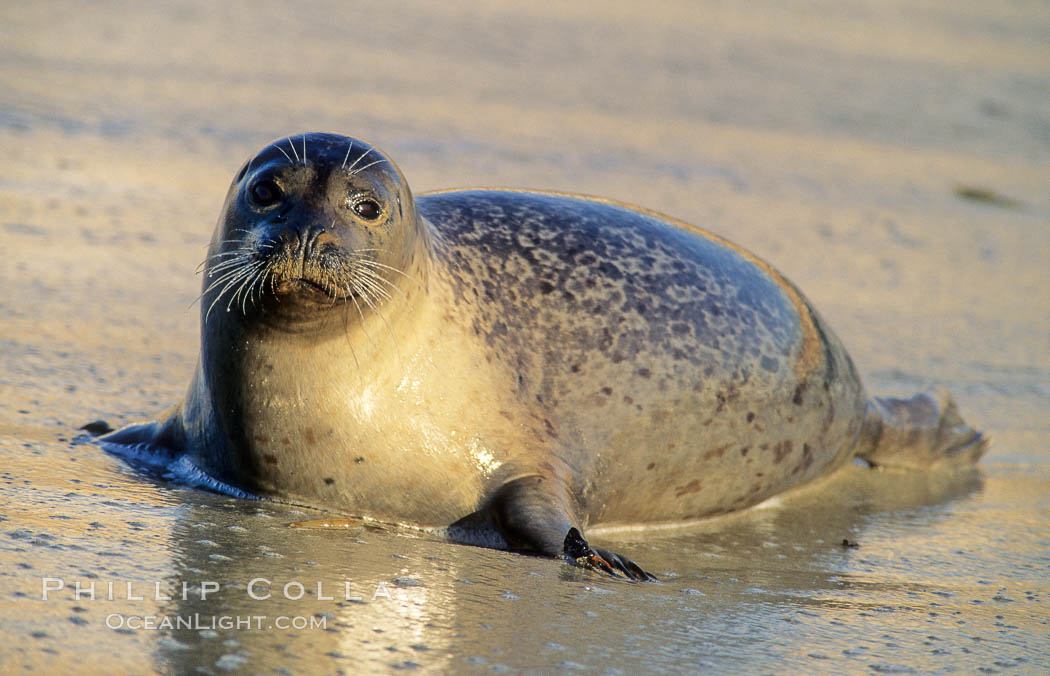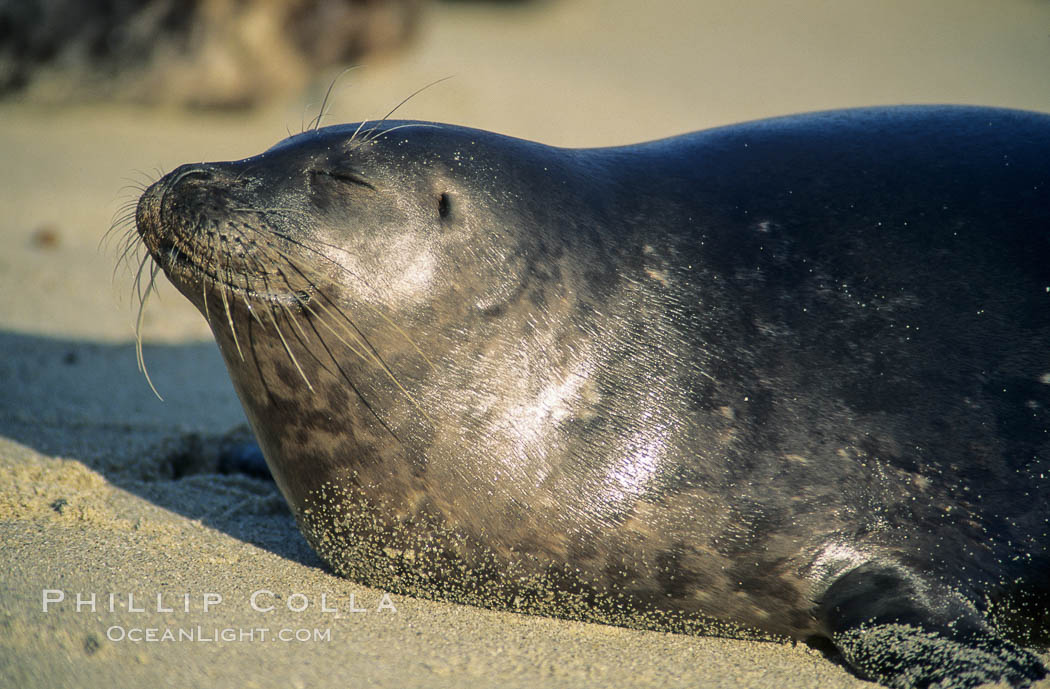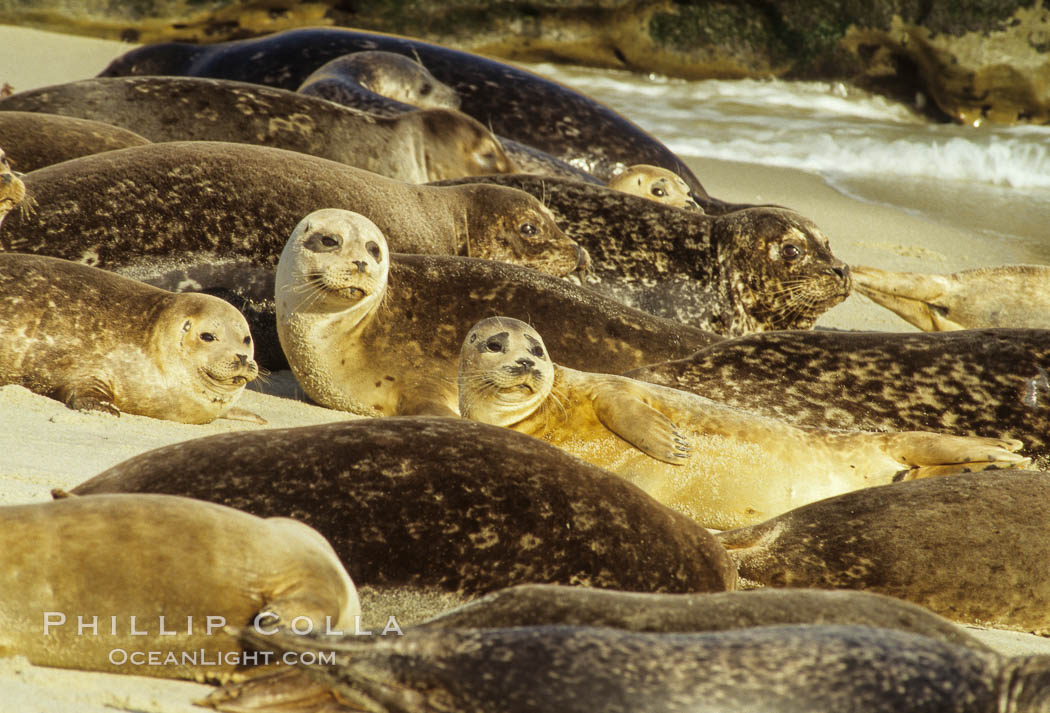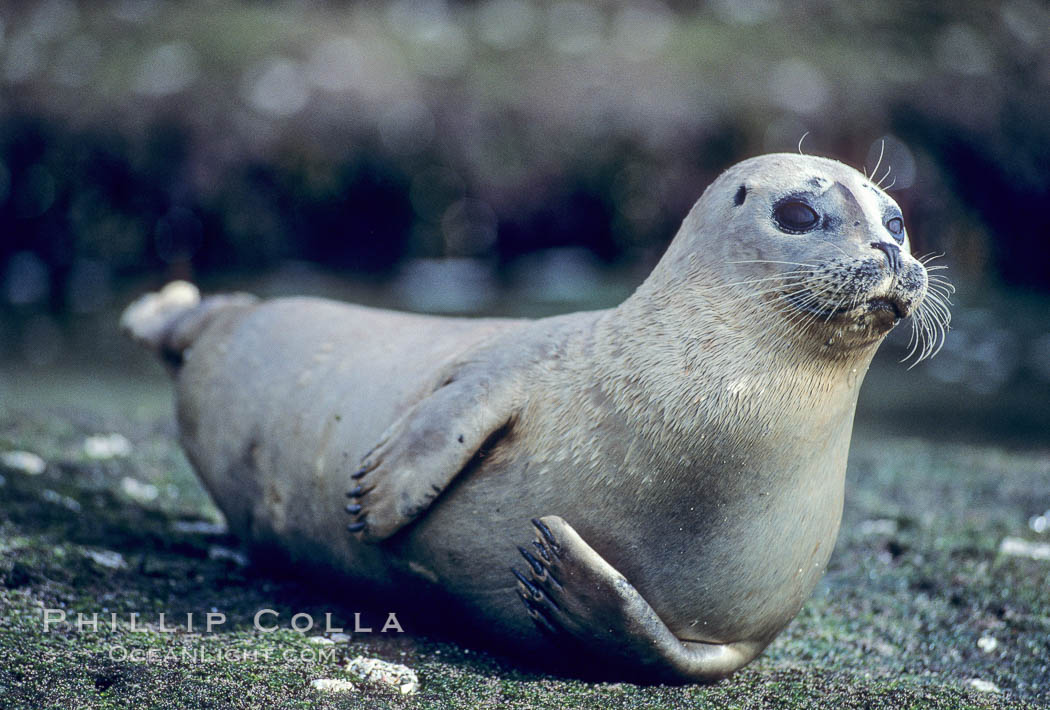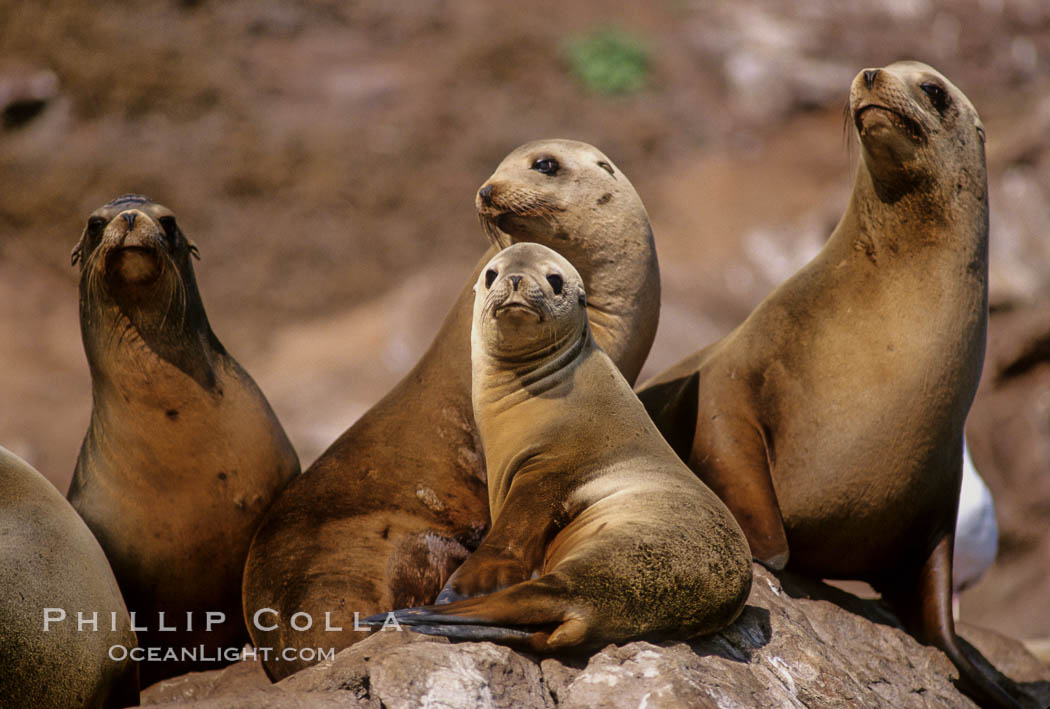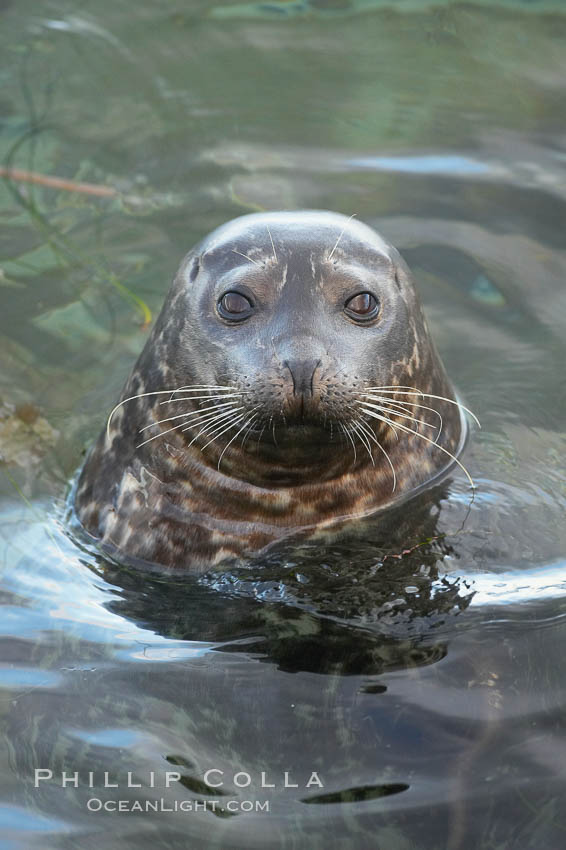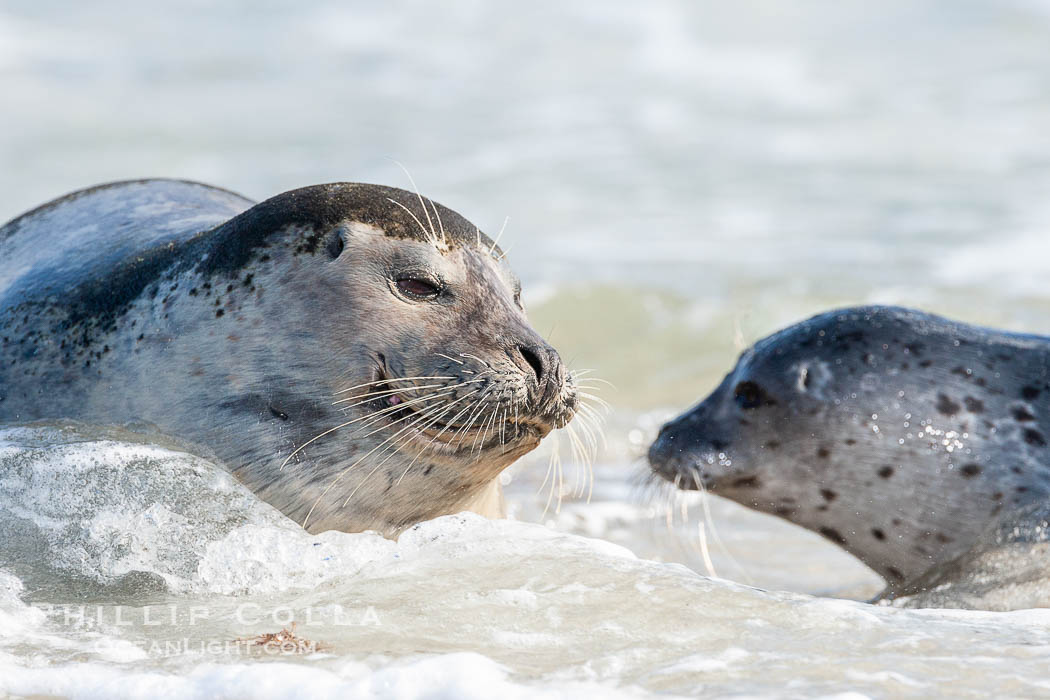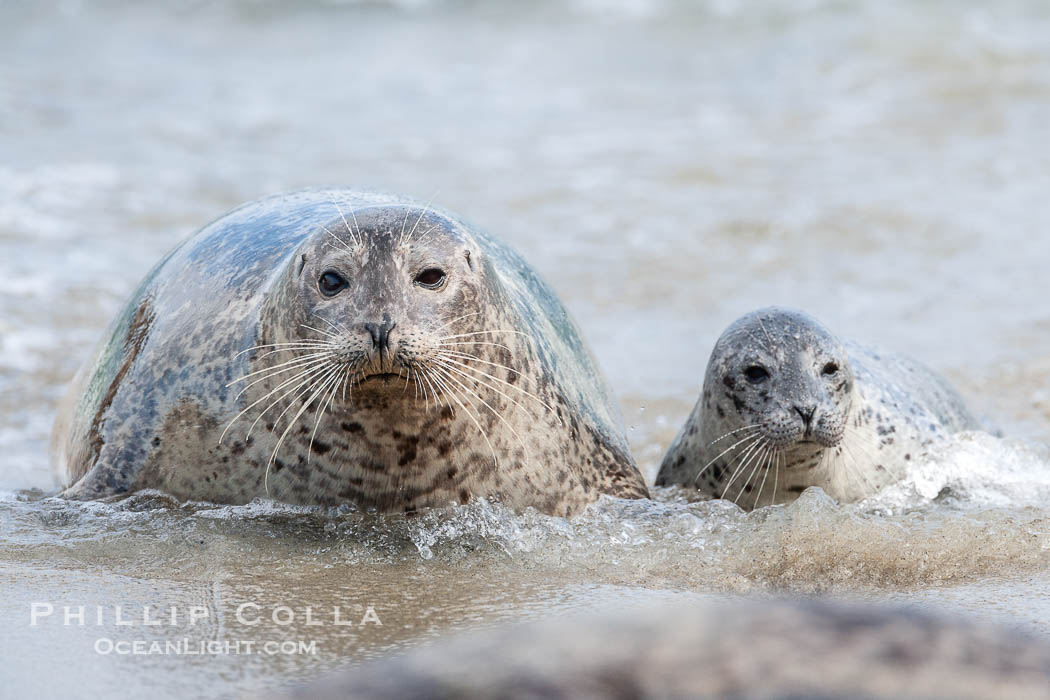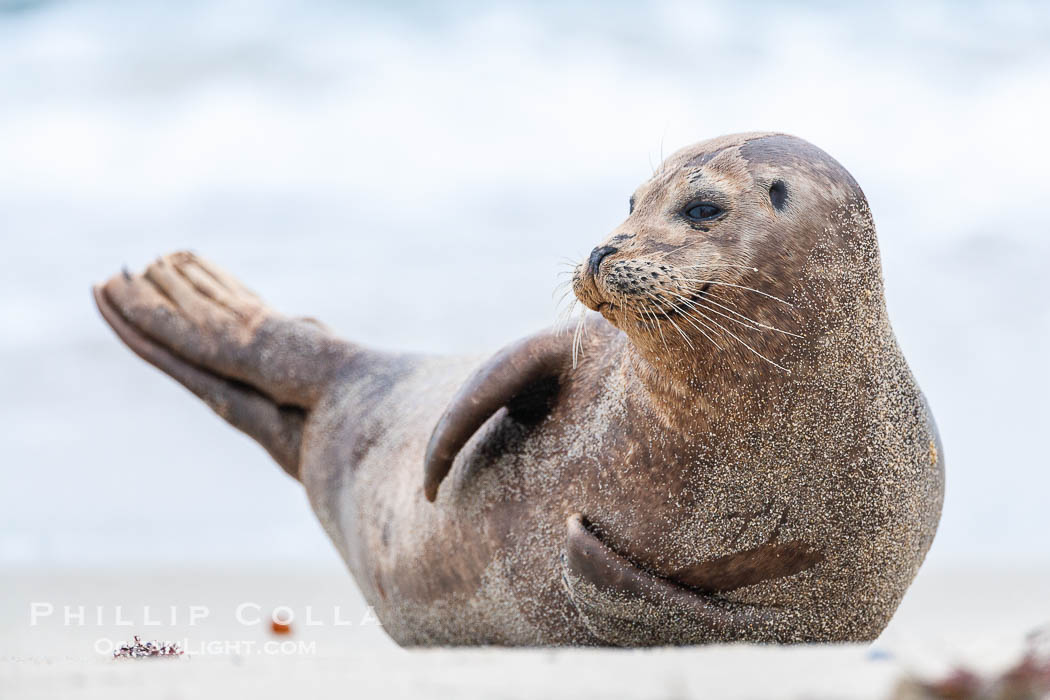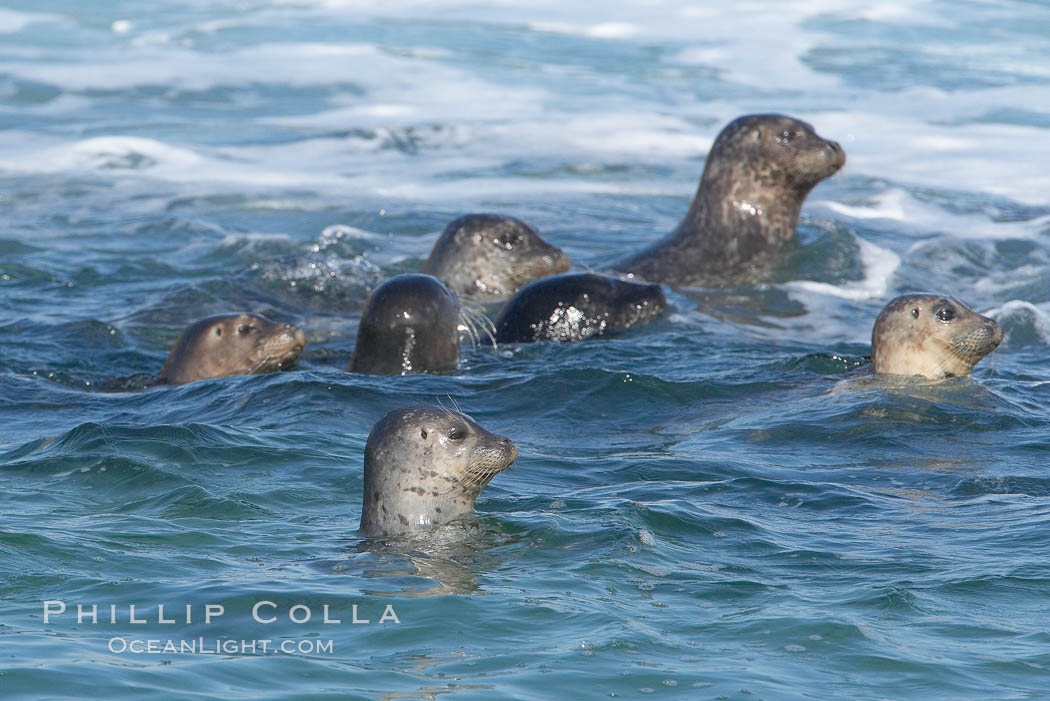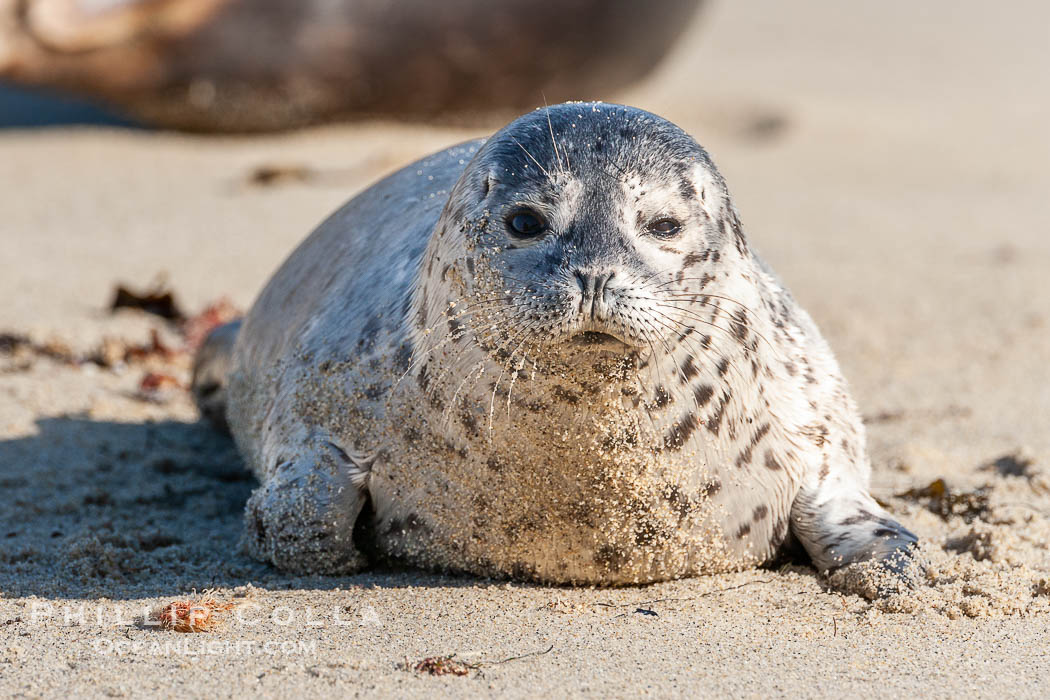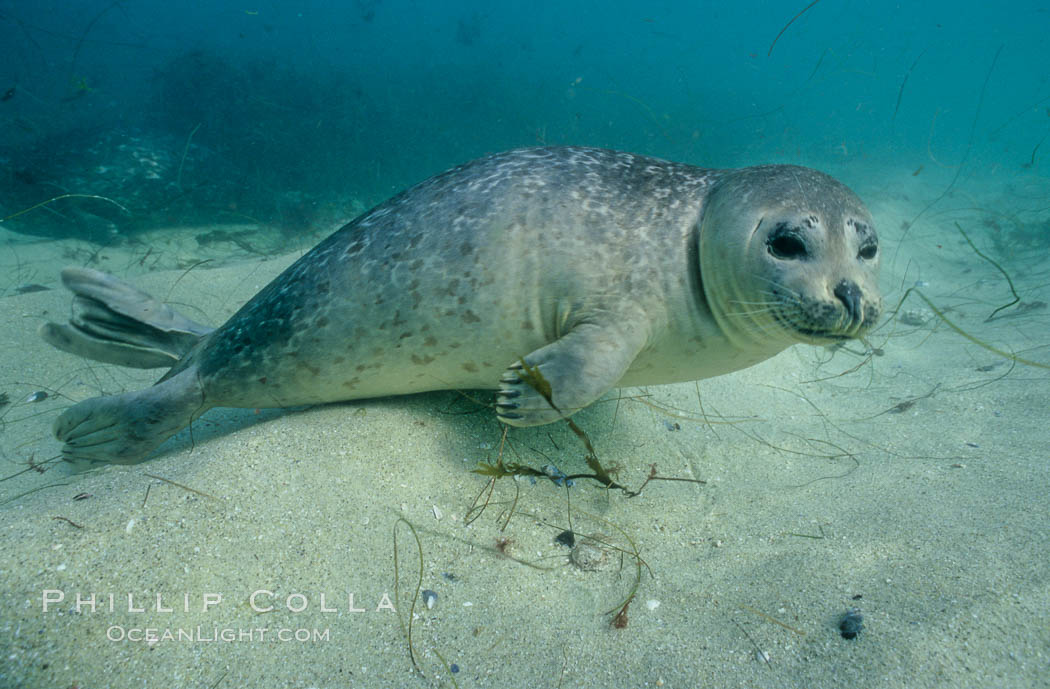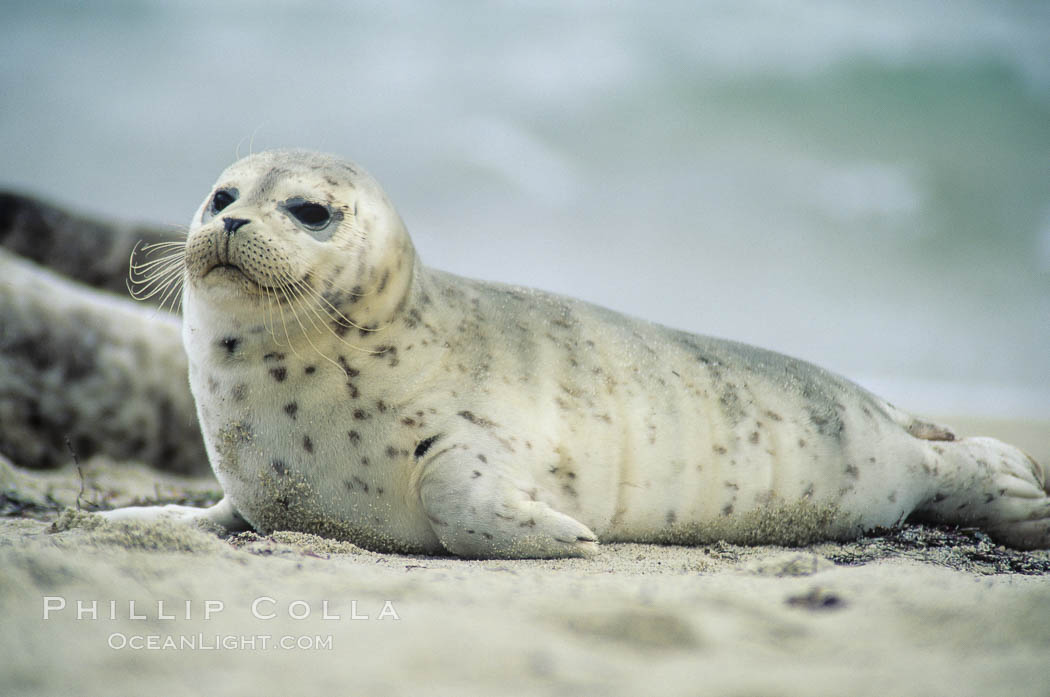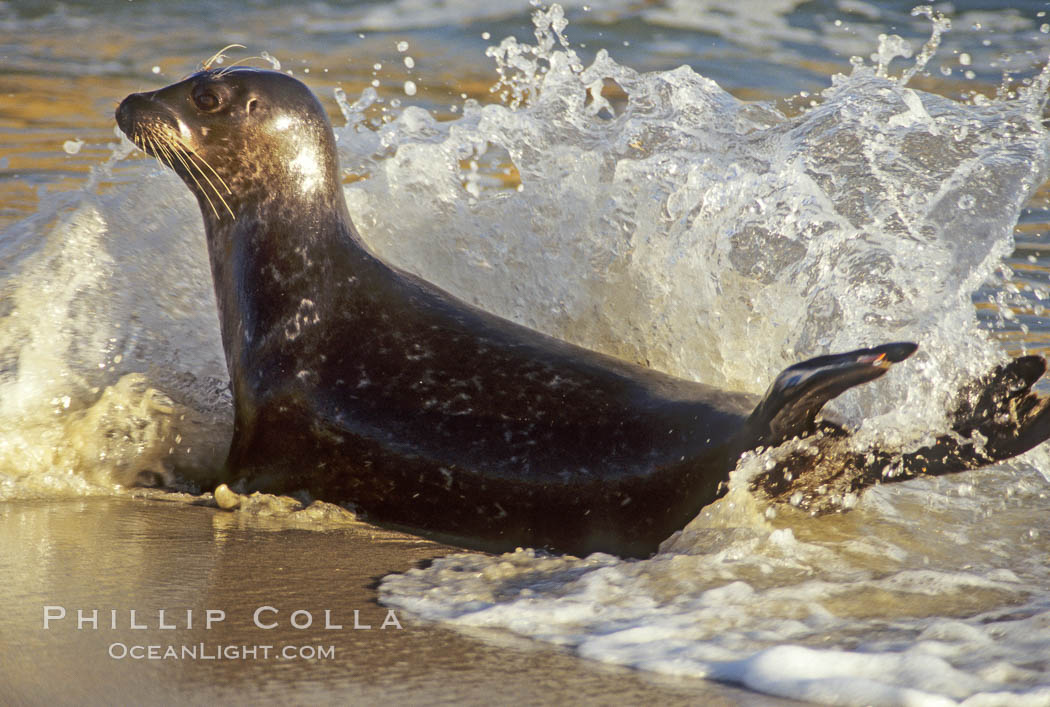Controversy over the La Jolla seals continues. To make a long story short: a group of Pacific harbor seals (Phoca vitulina) has taken up residence on the sand at the Children’s Pool, a small pocket cove in La Jolla, California also known as Casa Cove. Their presence there has led to associated restrictions in how people may use the beach. Historically (until the mid 1990’s) the beach has been fully available to people. However, in recent years the beach and waters just offshore have been reserved for exclusive use by the seals to minimize harassment of the seals by people, or simply closed due to seal fecal contamination, essentially making the Children’s Pool a prime seal watching spot but no longer available for most other beach uses. This has caused a heated debate to arise, with the core issue being: To Whom Does The Children’s Pool Beach Belong?
A Pacific harbor seal hauls out on a sandy beach. This group of harbor seals, which has formed a breeding colony at a small but popular beach near San Diego, is at the center of considerable controversy. While harbor seals are protected from harassment by the Marine Mammal Protection Act and other legislation, local interests would like to see the seals leave so that people can resume using the beach.
Image ID: 00296
Species: Pacific harbor seal, Phoca vitulina richardsi
Location: La Jolla, California, USA
This Pacific harbor seal has an ear with no external ear flaps, marking it as a true seal and not a sea lion. La Jolla, California. This group of harbor seals, which has formed a breeding colony at a small but popular beach near San Diego, is at the center of considerable controversy. While harbor seals are protected from harassment by the Marine Mammal Protection Act and other legislation, local interests would like to see the seals leave so that people can resume using the beach.
Image ID: 01957
Species: Pacific harbor seal, Phoca vitulina richardsi
Location: La Jolla, California, USA
Pacific harbor seals rest while hauled out on a sandy beach. This group of harbor seals, which has formed a breeding colony at a small but popular beach near San Diego, is at the center of considerable controversy. While harbor seals are protected from harassment by the Marine Mammal Protection Act and other legislation, local interests would like to see the seals leave so that people can resume using the beach.
Image ID: 01958
Species: Pacific harbor seal, Phoca vitulina richardsi
Location: La Jolla, California, USA
It should be noted that these harbor seals are not to be confused with California sea lions (Zalophus californianus). Harbor seals have no external ears and propel themselves in the water with their hind flippers. California sea lions are larger, have distinct external ear flaps and propel themselves with their fore flippers. California sea lions tend to be louder, barking often and engaging in mock sparring amongst themselves, while harbor seals vocalize much less. Occasionally a California sea lion will haul out on the Children’s Pool beach, but in general if you visit the beach and see animals on the sand they will all be harbor seals (and tourists).
A Pacific harbor seal hauls out on a rock. This group of harbor seals, which has formed a breeding colony at a small but popular beach near San Diego, is at the center of considerable controversy. While harbor seals are protected from harassment by the Marine Mammal Protection Act and other legislation, local interests would like to see the seals leave so that people can resume using the beach.
Image ID: 00940
Species: Pacific harbor seal, Phoca vitulina richardsi
Location: La Jolla, California, USA
California sea lions, Coronado Islands.
Image ID: 02160
Species: California sea lion, Zalophus californianus
Location: Coronado Islands (Islas Coronado), Baja California, Mexico
Historically the Children’s Pool has been the near-exclusive domain of human beach-goers, at least until the mid-1990’s when the harbor seals began to colonize the beach. Until that time, the beach was considered a perfect sunbathing spot and the man-made seawall provided relatively protected waters for people to splash and wade. Eventually, harbor seals came to the same conclusions and began using the beach in large numbers for similar purposes: resting, socializing, birthing and nurturing of their young. Certain interest groups would like to see the beach once again fully available to people for recreation, e.g., swimming, sunbathing, snorkeling and SCUBA diving. Some in this group feel that forcibly removing the seals, or encouraging their departure by modifying the seawall or changing the physical character of the cove and beach, is the way to achieve this.
A Pacific harbor seal eyes the photographer while swimming in the shallows. This group of harbor seals, which has formed a breeding colony at a small but popular beach near San Diego, is at the center of considerable controversy. While harbor seals are protected from harassment by the Marine Mammal Protection Act and other legislation, local interests would like to see the seals leave so that people can resume using the beach.
Image ID: 15546
Species: Pacific harbor seal, Phoca vitulina richardsi
Location: La Jolla, California, USA
Pacific harbor seal, mother and pup.
Image ID: 15750
Species: Pacific harbor seal, Phoca vitulina richardsi
Location: La Jolla, California, USA
Pacific harbor seal, mother and pup.
Image ID: 15752
Species: Pacific harbor seal, Phoca vitulina richardsi
Location: La Jolla, California, USA
Certain opposing interest groups would like the harbor seals to have first rights to the beach in such a way that people may use the beach subject to the constraint that they do not disturb the harbor seals. Note that the key word in this idea is disturb. Depending on how disturbance of the harbor seals is defined, this could mean anything from unfettered use of the beach by people to little or no use at all. They feel that legislation currently on the books, most notably the Marine Mammal Protection Act, guarantees the harbor seals’ continuing use of the Children’s Pool beach free of harassment.
I am often asked my personal opinion on this topic, through calls and emails arising from Oceanlight.com regarding harbor seal photographs. So here it is. My personal opinion is that the beach must be set aside primarily for use by the harbor seals, subject to strict interpretation of the Marine Mammal Protection Act, with secondary use by people only to the extent that the harbor seals are not disturbed in any significant way. I also feel that the final determination of what constitutes harassment and disturbance should be determined by wildlife biology experts and marine mammal researchers working in concert with the provisions of the Marine Mammal Protection Act. Furthermore, where the definition of harassment and disturbance is unclear, I feel the most conservative position with regard to the welfare of the harbor seals should be taken: keep people far enough away from the harbor seals that harassment is no longer an issue.
Pacific harbor seal.
Image ID: 15765
Species: Pacific harbor seal, Phoca vitulina richardsi
Location: La Jolla, California, USA
A group of Pacific harbor seals swim in the Childrens Pool in La Jolla.
Image ID: 15050
Species: Pacific harbor seal, Phoca vitulina richardsi
Location: La Jolla, California, USA
Pacific harbor seal pup.
Image ID: 15776
Species: Pacific harbor seal, Phoca vitulina richardsi
Location: La Jolla, California, USA
In taking this position I am in the company of a number of considerable interested parties, including Sea Shepherd Society and Humane Society of the United States and HSUS again (see page 4). Depending on the participants of the discussion, and especially at the local level, this issue can be quite complex. There are a number of factors which have entered into the discussion, including
- Original dedication and intent of the beach, including construction of the seawall and “dedication” of the beach to the community and enjoyment of children by generous benefactor Ellen B. Scripps in 1931. The lawyers are having a field day with the details and implications of the 1931 dedication of the beach, including scrutiny of 75-year-old documents that never anticipated such an interesting turn of events as the occupation of a prized beach by pinniped interlopers. One ironic fact concerning the Children’s Pool beach: while it was originally “dedicated” to the children of San Diego (among other things), and for years has provided ideal beach locale for families and kids, now that the seals have taken residence on the beach the Children’s Pool area is probably a greater source of joy to San Diego’s children than it ever was. One simply has to see the happiness and appreciation obvious in a group of kids visiting the beach and admiring the harbor seals to see the truth in this.
- Some interests maintain that a compromise position is possible: that people can use the beach as they formerly did and that the harbor seals will successfully adapt to a shared use approach. Indeed, a city councilman has supported this idea, which is not a surprise considering politicians tend to avoid controversy if it threatens their career prospects — in this instance, the councilman (Scott Peters) has La Jolla constituents who apparently dislike having the seals in the midst of their tony, waterfront enclave. Compromise is often a noble pursuit, but in this case may be impossible to achieve in practice. Harbor seals are relatively timid animals, easily frightened, so it is difficult to conceive of a situation in which the small Children’s Pool beach and cove can be shared by people and harbor seals on a constant and continuing basis without the people gradually displacing the harbor seals entirely.
- It is not clear how or when this conflict will be resolved. The City of San Diego and NOAA Fisheries (ex National Marine Fishery Service) are the two primary agencies involved while a number of animal welfare organizations and local user groups are trying to influence matters. I consider the ultimate legislation involved in this issue to be the Marine Mammal Protection Act, and hope that its application is beneficial to the La Jolla seals. It should be noted that the MMPA protects harbor seals but does not offer protections to their habitat. Harbor seals are not threatened or endangered as a species.
- The La Jolla seal colony is unique in a number of ways and should be considered an important asset in the remarkable coastal ecology that is coastal San Diego. The Children’s Pool haul-out is the only known rookery and haul-out of the Pacific harbor seal in mainland Southern California. (Some uninformed commentators state that “seals” haulout and give birth in many coastal locations of California, but they are clearly confusing harbor seals and sea lions in this regard — the two species are quite distinct and deserve separate recognition and protections. ) The Children’s Pool colony is a productive rookery, with many seal pups being born there each winter (January through April). It is also the only known harbor seal rookery in the world at which people can approach harbor seals so closely to observe them.
- Certain local interests state that losing the use of the Children’s Pool beach is an unacceptable loss. Some local sport divers and swimmers are particularly vocal in this regard. I personally have made dozens, maybe even 100 or more, dives at the Children’s Pool over the years and feel that while it is a convenient and protected place to enter the water and offshore has enjoyable reef and kelp forest diving, it is not unique in either its diving or swimming offerings and, frankly, is not that great of a dive. One has simply to move 200 yards to the north or south to be in virtually identical environmental surroundings for diving or swimming, with the small inconvenience of a somewhat more difficult entry point.
- Arguments persist, online and in local newspapers, concerning the precise definition of harassment. These tend to degenerate into anti-MMPA rantings or obtuse navel-consideration. No legislation is perfect, including the MMPA, but its intent is well-founded in the law and how it is implemented, including how harassment applies in the matter of the La Jolla seals, will eventually be made clear. Until then a deliberately and clearly conservative policy regarding harassment biased toward the harbor seals’ welfare is appropriate.
Pacific harbor seal swims in the protected waters of Childrens Pool in La Jolla, California. This group of harbor seals, which has formed a breeding colony at a small but popular beach near San Diego, is at the center of considerable controversy. While harbor seals are protected from harassment by the Marine Mammal Protection Act and other legislation, local interests would like to see the seals leave so that people can resume using the beach.
Image ID: 03016
Species: Pacific harbor seal, Phoca vitulina richardsi
Location: La Jolla, California, USA
A Pacific harbor seal pup hauls out on a sandy beach. This group of harbor seals, which has formed a breeding colony at a small but popular beach near San Diego, is at the center of considerable controversy. While harbor seals are protected from harassment by the Marine Mammal Protection Act and other legislation, local interests would like to see the seals leave so that people can resume using the beach.
Image ID: 02162
Species: Pacific harbor seal, Phoca vitulina richardsi
Location: La Jolla, California, USA
A Pacific harbor seal leaves the surf to haul out on a sandy beach. This group of harbor seals, which has formed a breeding colony at a small but popular beach near San Diego, is at the center of considerable controversy. While harbor seals are protected from harassment by the Marine Mammal Protection Act and other legislation, local interests would like to see the seals leave so that people can resume using the beach.
Image ID: 00277
Species: Pacific harbor seal, Phoca vitulina richardsi
Location: La Jolla, California, USA
Keywords: La Jolla seals, Pacific harbor seal, Phoca vitulina richardsi, Children’s Pool, Casa Cove, La Jolla Cove, Marine Mammal Protection Act, photo, underwat
